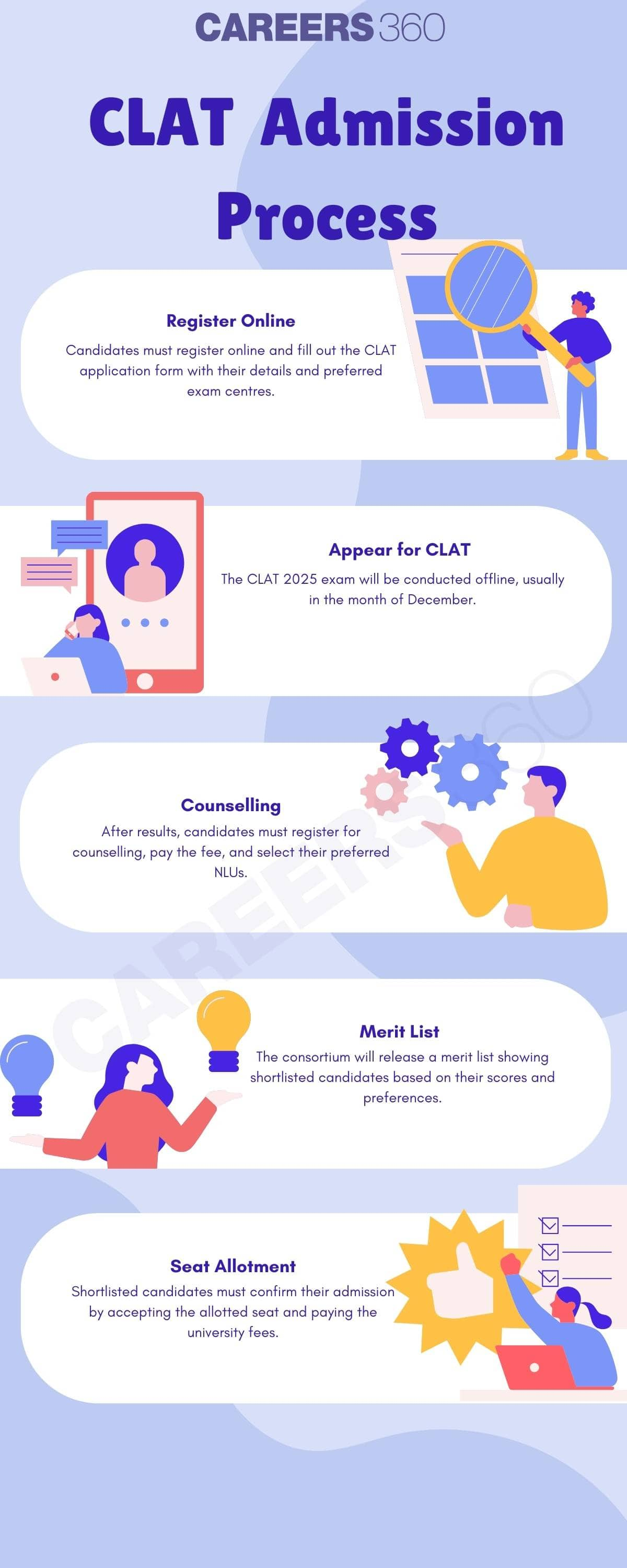Jindal Global Law School Admissions 2026
Ranked #1 Law School in India & South Asia by QS- World University Rankings | Merit cum means scholarships | Early Admissions (Pahse 2) Deadline: 28th Feb’26
The Consortium of National Law Universities (NLUs) will conduct CLAT admissions 2026 for admission into law programmes of participating NLUs. The Consortium has begun the CLAT 2026 application process on August 01, 2025. The last date to apply for CLAT 2026 has been extended till November 7, 2025. Candidates with a valid score in the exam will have to register for CLAT 2026 counselling as part of the CLAT 2026 admission process. There are 24 participating NLUs in CLAT admissions 2026. RPNLU Prayagraj is the latest NLU to join the consortium. There are a total of 3864 5-year LLB seats and 1,551 LLM seats in the admission process of CLAT 2026, including the CLAT NRI quota and supernumerary seats. Read on to get all the details on CLAT 2026 admission, including the admission counselling process, seat matrix and more.
This Story also Contains

The consortium will conduct CLAT 2026 on December 7, 2025, in offline mode. Only those students who appeared for the CLAT exam can participate in NLU admissions 2026 to enrol in the 5-year LLB and LLM programmes of participating NLUs.
| Particulars | Details |
|---|---|
| Conducting body | Consortium of NLUs |
| Accepted exam | Common Law Admission Test |
| Participating colleges | 24 NLUs |
| Courses offered | 5-year LLB, LLM |
| CLAT seats | 3705 5-year LLB seats and 1436 LLM seats |
Broady, the admission process of CLAT 2026 consists of two aspects, appearing for CLAT and participating in the counselling and seat allotment process. The steps in the CLAT 2026 admission process are listed below.
Submitting the CLAT 2026 application form: Interested candidates must first complete CLAT 2026 registration online through the official website. The application process involves steps such as creating a CLAT candidate login, filling up the form details, and providing CLAT exam centre preferences.
Appearing for the exam and get a valid score: After successful registration, candidates must appear for CLAT and get a valid score. CLAT 2026 is scheduled to be conducted tentatively in the second week of December 2025 in offline mode at 89+ test cities across the country.
Registering for the CLAT counselling 2026: After the publication of the CLAT 2026 result, candidates have to register for the CLAT 2026 counselling process by paying the prescribed counselling registration fee. Candidates are also required to submit their NLU preference list at this time. The CLAT 2026 admission can be obtained only in those NLUs that are part of the candidate’s preference list.
Publication of CLAT merit list 2026: After closing the counselling registration window, the consortium will publish the CLAT 2026 merit list for each participating NLU, which will include the details of the candidates shortlisted for admission. The merit list is published for each round of CLAT counselling. The category-wise CLAT 2026 cut-off will also be available for each NLU through the merit list.
Admission and Seat Allotment: The merit list is provisional. The shortlisted candidates have to complete document verification and payment of the seat confirmation fee, as well as the balance university fees, to obtain the final CLAT seat allotment in the allotted NLU. The confirmation fee and the counselling registration fee will be adjusted against the university fee to be paid by the candidate.
Ranked #1 Law School in India & South Asia by QS- World University Rankings | Merit cum means scholarships | Early Admissions (Pahse 2) Deadline: 28th Feb’26
Among top 100 Universities Globally in the Times Higher Education (THE) Interdisciplinary Science Rankings 2026

Given below are the different fees involved in the various stages of the admission process of CLAT 2026. The fees include the application fee, counselling registration fee, confirmation fee and university fee. The fee details are given below.
Particulars | Details |
|---|---|
CLAT 2026 registration fees | Rs. 4000 for General/ OBC/PwD/NRI/PIO//OCI category Rs. 3500 for SC/ST/BPL category |
CLAT 2026 counselling registration fee | Rs. 30000 for general Rs. 20000 for ST/ SC/ OBC/ BC/ EWS/ PWD |
CLAT 2026 confirmation fee | Rs. 20000 |
Balance university fees | NLU fees structure 2026 |
NLU Name | Courses offered | CLAT Seats (excluding supernumerary and NRI seats) | Fees |
|---|---|---|---|
BA LLB (Hons.) | 300 | Rs 4.10 lakhs p.a. | |
BA LLB (Hons.) | 132 | Rs 2.70 lakhs p.a. | |
BA LLB (Hons.) | 104 | Rs 3.30 lakhs p.a. | |
BSc LLB (Hons.) | 59 | ||
BA LLB (Hons.) | 110 | Rs 3.85 lakhs p.a. | |
B.Sc LLB (Hons.) | 52 | ||
BA LLB (Hons.) | 90 | Rs 3.06 lakhs p.a. | |
BBA LLB (Hons.) | 30 | ||
BA LLB (Hons.) | 170 | Rs 2.15 lakhs p.a. | |
5-year LLB (BA LLB(Hons.); BCom LLB(Hons.); BSc LLB (Hons.); BBA LLB(Hons) and BSW LLB(Hons) | 172 | Rs 2.58 lakhs p.a. | |
BA LLB (Hons) | 66 | Rs 2.58 lakhs p.a. | |
BA LLB (Hons) | 169 | Rs 1.70 lakhs p.a. | |
BA LLB (Hons) | 180 | Rs 2.59 lakhs p.a. | |
BA LLB (Hons) | 69 | Rs 2.57 lakhs p.a. | |
BBA LLB (Hons) | 69 | ||
BA LLB (Hons) | 60 | Rs 2.14 lakhs p.a. | |
BA LLB (Hons) | 106 | Rs 2.4 lakhs p.a. | |
BBA LLB (Hons) | 53 | ||
BA LLB (Hons) | 120 | Rs 2.41 lakhs p.a. | |
BBA LLB (Hons) | 60 | ||
BA LLB (Hons) | 60 | Rs 2.44 lakhs p.a. | |
BA LLB (Hons) | 120 | Rs 2.09 lakhs p.a. | |
BA LLB (Hons) | 56 | Rs. 1.17 Lakhs pa (TN SC/ST) Rs. 1.23 Lakhs pa (TN first generation graduate) Rs. 2.17 pa (All India SC/ST) Rs. 2.23 Lakhs pa (Others) Nil (TN Govt. schools quota) | |
BCom LLB (Hons) | 56 | ||
BA LLB (Hons) | 100 | Rs. 3.28 Lakhs p.a. (Maharashtra students) Rs. 3.62 Lakhs p.a. (All India) | |
BA LLB (Hons) | 120 | Rs 3.60 lakhs p.a. | |
BA LLB (Hons in Adjudication and Justicing) | 60 | ||
BBA LLB (Hons) | 60 | ||
BA LLB (Hons.) | 60 | Rs. 2.66 Lakhs pa (Maharashtra students) Rs. 3.12 Lakhs pa (All India) | |
BBA LLB (Hons) | 60 | ||
BA LLB (Hons) | 120 | Rs 2.98 lakhs p.a. | |
BBA LLB (Hons) | 60 | ||
BA LLB (Hons) | 120 | Rs 2.96 lakhs p.a. | |
BA LLB (Hons) | 120 | Rs 1.87 lakhs p.a. | |
BA LLB (Hons) | 60 | Rs 1.81 lakhs p.a. | |
BA LLB (Hons.) | 60 | Rs 2.59 lakhs p.a. |
NLU Name | Course | CLAT Seats (excluding supernumerary and NRI seats) | Fees |
|---|---|---|---|
NLSIU Bengaluru | LLM | 120 | Rs 4.10 lakhs p.a. |
NALSAR Hyderabad | LLM | 66 | Rs 1.75 lakhs p.a. |
NLIU Bhopal | LLM | 60 | Rs 2.45 lakhs p.a. |
WBNUJS Kolkata | LLM | 100 | Rs 2.72 lakhs p.a. |
NLU Jodhpur | LLM | 80 | Rs 2.28 lakhs p.a. |
HNLU Raipur | LLM | 90 | Rs 1.65 lakhs p.a. |
GNLU Gandhinagar | LLM | 57 | Rs 2.62 lakhs p.a. |
GNLU Silvassa Campus | LLM | 33 | Rs 2.62 lakhs p.a. |
RMLNLU Lucknow | LLM | 48 | Rs 1.10 lakhs p.a. |
RGNUL Patiala | LLM | 58 | Rs 2.19 lakhs p.a. |
NUALS Kochi | LLM | 60 | Rs 1.63 lakhs p.a. |
NLUO Cuttack | LLM | 44 | Rs 1.87 lakhs p.a. |
NUSRL Ranchi | LLM | 60 | Rs 2.20 lakhs p.a. |
NLUJA Kamrup | LLM | 40 | Rs 2.11 lakhs p.a. |
DSNLU Visakhapatnam | LLM | 60 | Rs 1.89 lakhs p.a. |
TNNLU Tiruchirappalli | LLM Corporate and Securities Laws | 20 | Rs. 1.13 Lakhs p.a. (TN SC/ST) |
LLM Intellectual Property Law | 20 | Rs. 1.68 Lakhs p.a. (All India SC/ST) | |
LLM (Natural Resources Law) | 20 | Rs. 1.74 Lakhs p.a. (Others) | |
MNLU Mumbai | LLM | 50 | Rs. 2.52 Lakhs p.a. (Maharashtra students) Rs. 2.64 Lakhs p.a. (All India) |
MNLU Nagpur | LLM | 60 | Rs 3.13 lakhs p.a. |
MNLU Aurangabad | LLM | 60 | Rs. 1.80 Lakhs p.a. (Maharashtra students) Rs. 2.05 Lakhs p.a. (All India) |
HPNLU Shimla | LLM | 80 | Rs 2.70 lakhs p.a. |
DNLU Jabalpur | LLM | 50 | Rs 2.96 lakhs p.a. |
NLU Tripura | LLM | 50 | Rs 1.51 lakhs p.a. |
RPNLU Prayagraj | LLM | 10 | Rs 1.99 lakhs p.a. |
Frequently Asked Questions (FAQs)
12th marks matter only for the CLAT eligibility criteria to appear in the exam. The marks in class 12 are not considered at the time of NLU admission.
There are no passing marks for CLAT. Candidates are ranked in the merit list as per their CLAT score and considered for admission.
Candidates who have a valid score in the CLAT exam and who paid the counselling registration fee are eligible to participate in the CLAT counselling process.
On Question asked by student community
Since you have not specified your category, I will answer for all categories. A CLAT rank of 38169 (typically 40-45 marks) makes admission to top NLUs difficult. For General candidates, chances are nil. Even for OBC, SC, and ST categories, admission is primarily possible only through state domicile quotas or
After the CLAT results are declared, candidates participate in a centralised online counselling process managed by the Consortium of NLUs. Eligible candidates register on the official portal, submit their NLU preference list , and pay a counselling fee. Seat allotment happens across multiple rounds based on rank, category, and preferences,
Hi, you can apply for admissions in Nirma University, NFSU Ahemdabad, Alliance, IPU University and affiliated instiutes (in case you are reserved category candidates), UPES Dehradun, BITS Law School etc.
Start preparing for CLAT by first understanding the exam pattern and syllabus, which includes English, Current Affairs, Legal Reasoning, Logical Reasoning, and Quantitative Techniques. Make a simple daily routine and begin with basics read newspapers regularly for current affairs, practice comprehension passages for English and legal sections, and solve basic
Hello,
With a CLAT AIR of 33599 and SC category rank of 2103, and being a Delhi domicile, your chances at IP University (GGSIPU) are moderate to good, especially in later counselling rounds.
Based on previous year trends, some IPU-affiliated law colleges have closed at higher SC category ranks, so
Among top 100 Universities Globally in the Times Higher Education (THE) Interdisciplinary Science Rankings 2026
NAAC A+ Accredited | Among top 2% Universities Globally (QS World University Rankings 2026)
Admissions open for B.A. LL.B. (Hons.), B.B.A. LL.B. (Hons.) and LL.B Program (3 Years) | School of Law, MRU ranked No. 1 in Law Schools of Excellence in India by GHRDC (2023)
Excellent curriculum; an impressive range of electives, besides core law courses. Up to 100% merit scholarship on a first-come, first-served basis
Moot Court | Mock trials | Legal Aid Clinic
NAAC A++ Accredited | Ranked #11 by NIRF